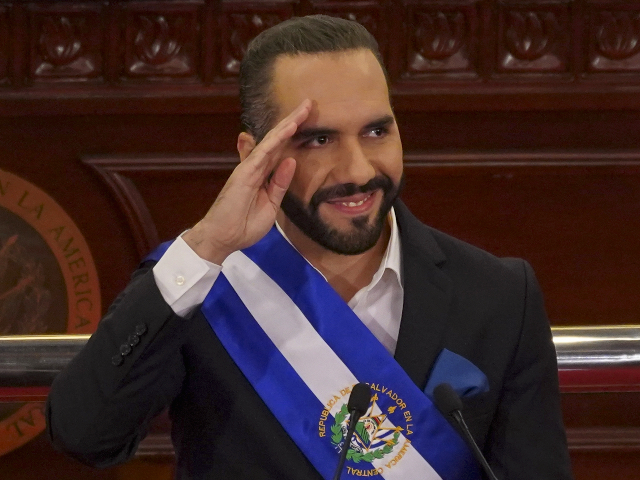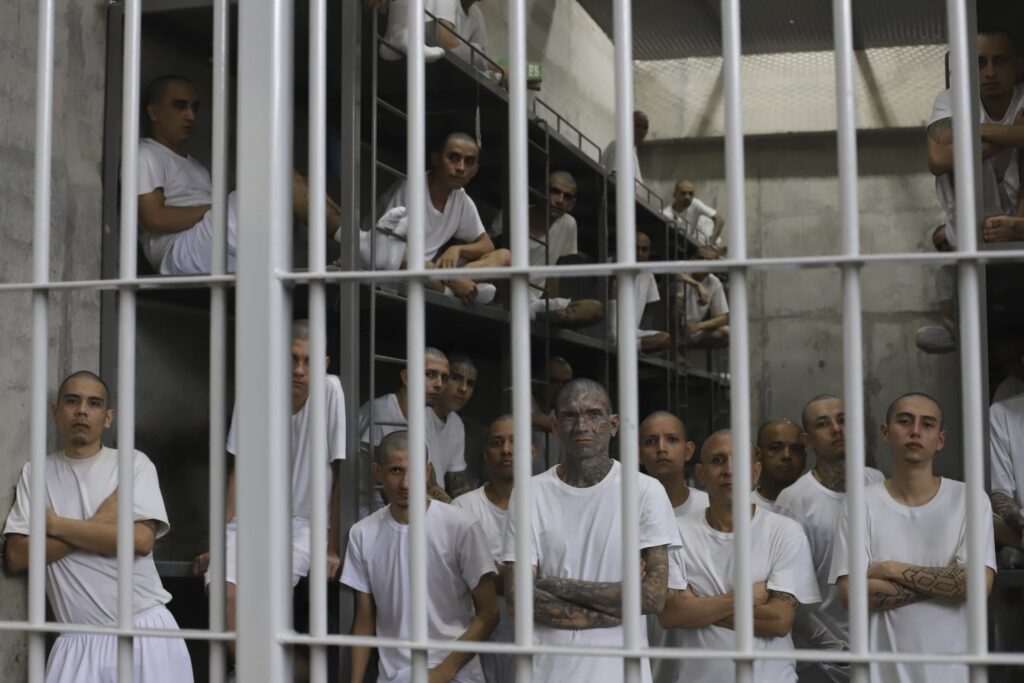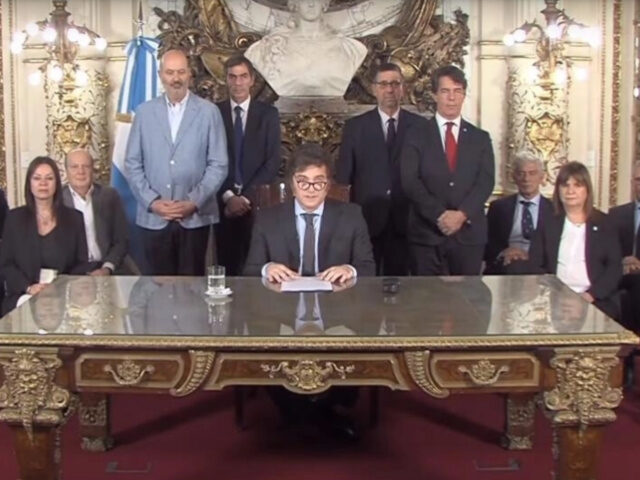The government of Argentina is interested in adapting the security policies enacted by Salvadoran President Nayib Bukele to help curb gang violence, Security Minister Patricia Bullrich told the news network Infobae on Monday.
Bullrich’s remarks follow a public offering by Bukele to collaborate with Argentina and help it overcome its gang violence and crime issues, especially in the crime- and drug-gang-plagued city of Rosario.
“We are interested in adapting the Bukele model. Violence in Argentina is strong,” Bullrich told Infobae. “Last weekend there were deaths in soccer, it was a summer with constant fights, gangs.”
“The [Mara Salvatrucha] model is complicated, but we see the increase in the level of violence of gangs that cross paths, or the confrontations in nightclubs,” she continued. “We are interested in working on this violence.”
Mara Salvatrucha-13 (MS-13) is one of El Salvador’s largest and deadliest drug gangs, its influence spreading throughout the Western Hemisphere including in the United States.
Bullrich recounted that Bukele’s Security Minister Gustavo Villatoro had traveled to Argentina to represent El Salvador at Milei’s presidential inauguration. Both ministers were able to converse on the subject of crime and how El Salvador had been able to solve its problem.
“We agreed to organize a visit there, knowing that their problems are very difficult, very hard, but that they achieved a very, very important reduction,” Bullrich said. “I was surprised that my name came up, but it seems that the Minister talked about it. We have not yet taken up the subject.”
The security cooperation, Bullrich explained, would be technical and would not involve the participation of Salvadoran security forces in Argentina.
“Yes, technical, of how they managed to make progress on crime and legislation,” Bullrich said.
When asked if there is any explicit pressure from Milei to show results against crime in the short term, Bullrich answered that there is none and that it is the Security Ministry’s decision.
“The President is interested in adding to the possibility of economic success the possibility of greater order in the streets,” Bullrich said. “I think he has confidence in the team. He sees that things are being done.”
Upon taking office, Bullrich oversaw changes in Argentina’s security policies regarding the handling of protests and violent riots. Leftist rioters have continuously attempted, with little success, to incite chaos in Buenos Aires as the Argentine Congress debates the massive omnibus bill project Milei presented in December.
One of the new policies Bullrich implemented transfers the security costs incurred by the Argentine police authorities to the protesters and rioters themselves. Bullrich estimated that the costs of damages caused by the recent protests outside Congress against the omnibus bill were about 134 million Argentine pesos (roughly $161,530).
“We said that we were going to tally the damages caused by the permanent aggression in Congress,” Bullrich said. “We present the expenses of the operation to the Court so that, once the organizations and those responsible have been identified, they can be charged.”
The Argentine Security Ministry also requested from the nation’s courts permission to seize the properties of the rioters who caused damages outside Congress to help cover the damages.
Salvadoran President Bukele, recently reelected in an unprecedented election, previously confirmed the security cooperation with the Argentine government during a Sunday press conference.

Nayib Bukele, El Salvador’s president, delivers a state of the union address at the National Palace in San Salvador, El Salvador, on Wednesday, June 1, 2022. (Camilo Freedman/Bloomberg via Getty)
“The measures that we can share with Argentina, perhaps they wouldn’t have to be so drastic because they don’t have problems as big as ours. In the face of smaller problems, maybe the medicine can be smaller,” Bukele said.
Bukele, during the press conference, gave his appreciation of Argentina’s current situation with regards to crime and insecurity:
I would believe that the problem in Argentina is smaller, although worrying, especially in Rosario and some areas, but it is smaller than in El Salvador and, therefore, although some things can be applied — and it would be, I believe, positive to apply them — it would not have to be so drastic because the problem, compared to what we had previously in El Salvador, which was the world capital of homicides, is quite minor to apply these measures.
Bukele mentioned that “there are similarities” between the two countries, both culturally and in terms of “crime problems, which are generally the result of poverty,” so that “what is happening in El Salvador can be taken as an example.”
The Salvadoran president, using a still-active “state of exception” decree passed in March 2022, enacted a massive crackdown on El Salvador’s violent criminal gangs. The decree, which restricts certain constitutional rights, allowed for a massive expansion of police authority, the construction of a “mega-prison” for criminals, and expedited mass trials, among other security measures.

Inmates attend a class on social behavior from inside their shared cell during a press tour of the Terrorism Confinement Center, a mega-prison in Tecololuca, El Salvador, Thursday, October 12, 2023. (AP Photo/Salvador Melendez)
The crackdown has almost universally been considered a huge success as it has not just dramatically reduced crime in El Salvador, but led to the virtual disappearance of the nation’s largest criminal gangs within its borders.
Bukele also commented on the “quite long” telephone conversation he had with Milei after Milei was proclaimed the winner of Argentina’s November runoff election.
“He [Milei] gave me a very difficult panorama of Argentina and, especially in the economic area, the issue of foreign exchange, inflation, etcetera,” Bukele said. “It’s going to be very hard any way it’s done. I understand that there are very talented people and a lot of smart people with him, apart from the fact that he is a smart person as well, but it is going to be hard to solve it.”
“I know it’s a problem of size – apart from the differences between the economy and security – but of that size, on the economic issue,” he continued, equating the seriousness of the economic situation in Argentina with the security problem that El Salvador had.
Bukele said he wished Milei the best, reiterating his willingness to cooperate with the Argentine government.
“We are a very small country to collaborate with economically, but if we can collaborate with whatever, security, cooperation or whatever, we will be at your disposal,” Bukele concluded.
The Salvadoran president did not participate in Milei’s inauguration, opting to send Security Minister Villatoro instead as, at the time, Bukele was under a six-month administrative leave to comply with a controversial court ruling that allowed him to run for reelection on Sunday. The Salvadoran government explicitly bans presidents from running for reelection.
WATCH — Law and Order: El Salvador Builds “Mega Prison” to Eradicate Gangs
Video Source: Presidency of the Republic of El Salvador via StoryfulChristian K. Caruzo is a Venezuelan writer and documents life under socialism. You can follow him on Twitter here.

COMMENTS
Please let us know if you're having issues with commenting.